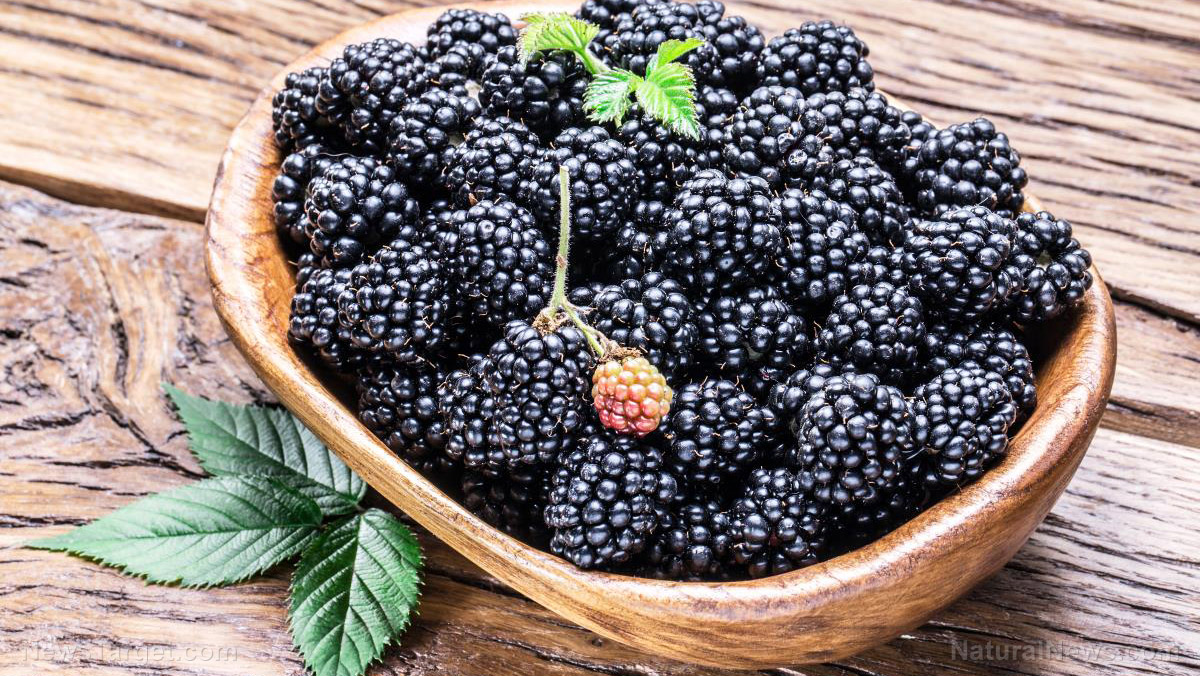Rich in health benefits, enjoy blackberries all year
07/13/2019 / By Zoey Sky

Blackberries (Rubus fruticosus) are usually picked between July to August, but you can enjoy these nutritious berries throughout the year. Like other berries, blackberries offer amazing health benefits. Here are just some of them.
They’re rich in vitamin C.
A cup of raw blackberries provides at least half of the recommended daily target for vitamin C.
Vitamin C is crucial for various bodily functions:
- It helps boost your immunity.
- It keeps your skin healthy.
- It’s essential for DNA repair.
- It’s necessary for the production of collagen and serotonin, a neurotransmitter that promotes happiness and sleep.
- It promotes wound healing.
- It helps fight free radicals in your body.
- It improves iron absorption.
- It helps prevent scurvy.
They’re chock-full of fiber.
A cup of fresh blackberries (or 1 and 1/4 cups of frozen blackberries) contains around 60 calories and about eight grams of fiber, or one-third of the recommended daily value.
Fiber promotes weight loss by making you feel full for longer periods and curbing cholesterol. Dietary fiber can also help regulate blood sugar and insulin levels. Getting enough dietary fiber can prevent digestive issues such as bloating, constipation, or stomach pain.
Blackberries also support digestive health because their fiber content serves as prebiotics, which feed the beneficial bacteria in your gut that are often associated with immunity, mood, and anti-inflammatory effects.
They help protect your brain.
Blackberries contain antioxidants that protect against brain inflammation, as well as help change the way neurons communicate. Both these outcomes may slow age-related memory loss, strengthen motor coordination, and prevent cognitive decline.
They support bone health.
Consuming a one-cup serving of raw blackberries can give you more than one-third of the daily recommended value for vitamin K, which helps with blood clotting and is crucial for bone health.
Vitamin K is necessary for bone formation. Some studies suggest that vitamin K deficiency is associated with blood thinning and a greater risk for fractures and osteoporosis.
A cup of blackberries also contains half the daily recommended value of manganese. This mineral also supports bone health and collagen production for healthy skin and joints.
Manganese is important for healthy bone development and a strong immune system. Additionally, it helps your body metabolize amino acids, carbs, and cholesterol.
They help manage blood sugar.
Blackberries are a low-GI (glycemic index) fruit, ranking at 25. They are also one of the lowest-sugar fruits – one cup of fresh blackberries only contains around seven grams of sugar.
The low-sugar and high-fiber content of blackberries make them a natural and effective option for regulating blood sugar and insulin levels.
Adding blackberries to your diet
Blackberries are a versatile fruit. You can add fresh blackberries to oatmeal, overnight oats, or Greek yogurt. They can also add a hint of sweetness to garden salads or whole grain side dishes.
Fresh blackberries are the perfect topping for desserts like pudding. You can make a simple blackberry sauce by adding slightly mashed berries to drinking water. You can also puree blackberries with a bit of fresh ginger root and honey. Drizzle the sauce on pancakes or oatmeal.
Frozen blackberries are just as versatile as fresh ones. You can turn frozen berries into a refreshing smoothie, or you can thaw them to be used as fresh berries.
Use frozen berries to make a simple dessert by sauteing them in a saucepan over low heat with some freshly grated ginger and maple syrup. Combine almond butter, ground cinnamon, and rolled oats to top the warm berries with a homemade crumble.
Interested to know how else blackberries can improve your meals? Visit Fruits.news to learn more.
Sources include:
Submit a correction >>
Tagged Under:
This article may contain statements that reflect the opinion of the author
RECENT NEWS & ARTICLES
COPYRIGHT © 2017 SUPER FOODS NEWS





















